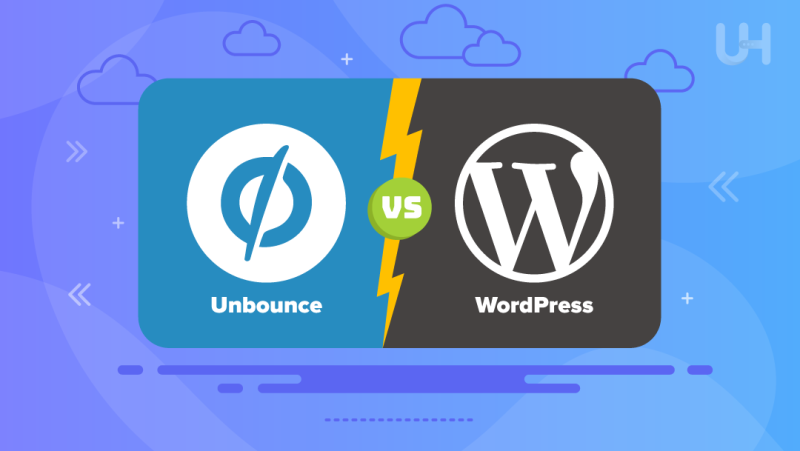Unbounce and WordPress are both popular platforms for website creation, but they serve different purposes. Unbounce is great for creating high-converting landing pages without coding knowledge, while WordPress is a versatile CMS suitable for various types of websites. Choosing between Unbounce vs WordPress is crucial for achieving online goals effectively.
In this blog, we’ll compare WordPress vs Unbounce to determine which offers better value, considering factors like cost, customization options, scalability, and user-friendliness. By the end, you’ll be able to make an informed decision based on your specific needs and preferences.
Unbounce: Features and Benefits
Unbounce is a powerful landing page builder designed to simplify the process of creating high-converting landing pages. It offers a user-friendly drag-and-drop interface, allowing users to design custom landing pages without the need for coding skills. With Unbounce, you can easily customize every aspect of your landing pages, including layout, content, forms, and CTAs (call-to-action), to optimize conversions and achieve your goals.
Key features offered by Unbounce
Unbounce provides a range of features tailored to enhance the effectiveness of landing pages, such as:
- Drag-and-Drop Builder: Intuitive interface for easy customization of Unbounce landing page elements.
- Templates: Pre-designed templates optimized for various industries and goals.
- A/B Testing: Capability to test different variations of landing pages to determine the most effective design and content.
- Dynamic Text Replacement: Personalization feature that dynamically changes text based on visitor attributes.
- Integration: Seamless integration with popular marketing tools like Mailchimp, HubSpot, and Google Analytics.
Advantages
Using Unbounce offers several advantages:
- Simplified Creation: Easily create professional-looking landing pages without technical expertise.
- Conversion Optimization: Access to features like A/B testing and dynamic text replacement to maximize conversion rates.
- Customization Options: Extensive customization options to tailor landing pages to specific marketing campaigns and target audiences.
- Integration Capabilities: Seamless integration with other marketing tools for streamlined workflow and data analysis.
- Time and Cost Efficiency: Save time and resources by quickly building and testing landing pages for optimal results.
WordPress: Features and Benefits
WordPress is a widely used content management system (CMS) that powers millions of websites worldwide. It offers a user-friendly interface and robust functionality, making it accessible to both beginners and experienced users. WordPress allows users to create, manage, and publish content, including text, images, videos, and more, with ease. Its flexibility and scalability make it suitable for various types of websites, from personal blogs to large e-commerce platforms.
Key features offered by WordPress
WordPress provides a plethora of features to enhance website creation and management, including:
- Themes: A wide selection of customizable WordPress themes to change the appearance of your website.
- Plugins: Extensive library of plugins to add additional functionality, such as SEO optimization, e-commerce capabilities, and social media integration.
- Content Management: Intuitive editor for creating and managing content, including posts, pages, and media.
- User Management: Multi-user capability with different roles and permissions for website administrators, editors, and contributors.
- SEO-Friendly: Built-in features and plugins to optimize your website for search engines, improving visibility and rankings.
Advantages
Using WordPress offers numerous advantages:
- Ease of Use: Intuitive interface and user-friendly tools make it easy for beginners to create and manage websites.
- Flexibility: Wide range of themes and plugins allow for customization and expansion of website functionality to suit individual needs.
- Scalability: Ability to scale your website as your business grows, from a simple blog on blog hosting to a full-fledged e-commerce store with e-commerce hosting.
- Community Support: Large and active community of users, developers, and contributors providing support, resources, and updates.
- Cost-Effective: Open-source platform with many free themes and plugins, reducing the cost of website development and maintenance.
Unlock Your Website’s Potential Today!
Ready to take your web development journey to the next level? Explore Ultahost’s WordPress hosting services and unleash the full power of your website. Get started now!
Value Comparison: Unbounce vs WordPress
Here’s the comparison of key features to help you make a wise decision:
Unbounce vs WordPress: Cost analysis

When comparing the cost of using Unbounce versus WordPress, it’s essential to consider several factors:
Unbounce: Unbounce typically operates on a subscription-based pricing model, with plans ranging from basic to enterprise, depending on features and usage. The cost can vary based on the number of landing pages, visitors, and additional features required.
WordPress: WordPress itself is free to use, but you’ll need to pay for web hosting, domain registration, premium themes, and plugins. The total cost will depend on your hosting provider, theme and plugin choices, and any additional services required.
In general, Unbounce may have a higher upfront cost due to its subscription fees, but it could be more cost-effective for businesses focusing solely on landing pages. On the other hand, WordPress offers more flexibility in terms of budget, allowing you to control costs based on your specific needs and preferences.
Customization Options and Ease of Use
Unbounce: Unbounce offers a straightforward drag-and-drop interface, making it easy for users to customize landing pages without coding knowledge. However, customization options may be limited compared to WordPress, particularly for building complex websites.
WordPress: WordPress provides extensive customization options through themes and plugins, allowing users to create highly customized websites tailored to their specific requirements. While WordPress may have a steeper learning curve initially, its flexibility and versatility make it suitable for users with varying levels of technical expertise.
In terms of ease of use, Unbounce may be more intuitive for beginners due to its simplified interface. However, WordPress offers greater flexibility and customization capabilities, making it more suitable for users seeking advanced customization options.
Unbounce vs WordPress: Scalability and Flexibility
Unbounce: Unbounce is primarily designed for creating landing pages, so its scalability may be limited compared to WordPress, especially for building large, multi-page websites or complex e-commerce platforms.
WordPress: WordPress is highly scalable and flexible, allowing users to create websites of any size or complexity. With thousands of themes and plugins available, WordPress can accommodate various needs, from personal blogs to enterprise-level websites.
Overall, WordPress offers greater scalability and flexibility compared to Unbounce, making it suitable for users who anticipate the need for expansion or additional features in the future. However, if your primary focus is on creating high-converting landing pages with minimal hassle, Unbounce may be the preferred option.
Unbounce vs WordPress: Community and Support
Unbounce: Unbounce provides dedicated support and resources for its users, including extensive documentation, tutorials, and a vibrant community forum where users can seek help, share ideas, and connect with fellow marketers.
WordPress: WordPress benefits from a vast and active community of users, developers, and contributors worldwide. With countless forums, blogs, and online resources available, users can find answers to their questions, troubleshooting tips, and valuable insights into maximizing the potential of the platform.
Unbounce vs WordPress: Integration
Unbounce: Unbounce integrates seamlessly with popular marketing tools and platforms, allowing users to connect their landing pages with email marketing services like Mailchimp , CRM systems, analytics platforms, and more. This integration facilitates data collection and analysis, enabling users to track campaign performance and make data-driven decisions.
WordPress: WordPress offers extensive integration capabilities through plugins, allowing users to connect their websites with a wide range of third-party services and tools. Whether you need to integrate with social media platforms, payment gateways, or e-commerce solutions, there’s likely a plugin available to meet your needs and streamline your workflow.
Conclusion
In conclusion, both Unbounce and WordPress offer unique strengths and capabilities for website creation, catering to different needs and preferences.
Unbounce shines in its simplicity and focus on creating high-converting landing pages. Its intuitive interface and dedicated conversion optimization features make it an excellent choice for marketers and small businesses seeking to drive conversions quickly and effectively.
On the other hand, WordPress stands out for its versatility, scalability, and extensive customization options. Whether you’re building a personal blog, a business website, or an e-commerce store, WordPress provides the flexibility and functionality to meet your needs and grow your business over time.
If you’re just starting and seeking a cost-effective solution to get the full potential of WordPress, consider affordable hosting options. To make your journey easy, check out Ultahost for low-cost WordPress hosting plans.
FAQ
Which platform is better for beginners, Unbounce or WordPress?
Unbounce offers a more straightforward interface with its drag-and-drop builder, making it easier for beginners to create landing pages without coding knowledge. WordPress, while initially more complex, provides extensive documentation and resources to help beginners get started with website creation.
Are there any limitations to Unbounce’s customization options?
While Unbounce offers a range of customization options for landing pages, its focus is primarily on optimizing conversions. Users may find limitations in creating complex website structures or implementing advanced features compared to the extensive customization options available in WordPress.
Which platform is more cost-effective, Unbounce or WordPress?
The cost-effectiveness of Unbounce versus WordPress depends on individual needs and usage. Unbounce operates on a subscription-based model, while WordPress itself is free but requires expenses for web hosting, domain registration, themes, and plugins.
Which platform is better for SEO, Unbounce, or WordPress?
Both Unbounce and WordPress offer SEO-friendly features, but WordPress provides more extensive capabilities due to its wide range of SEO plugins and customization options. With WordPress, users have greater control over on-page SEO elements, content optimization, and technical SEO aspects, making it a preferred choice for many SEO professionals.









